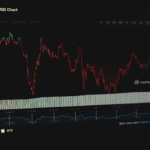
Cryptocurrency markets are highly sensitive to global economic conditions, with macroeconomic factors playing a significant role in shaping market trends. Understanding these factors is essential for investors and traders seeking to navigate the volatile world of digital assets. This blog discusses how inflation, interest rates, and other economic variables influence the crypto market.
Inflation and Cryptocurrency as a Hedge
Inflation, the rate at which the general price level of goods and services rises, erodes the purchasing power of fiat currencies. During periods of high inflation, investors often seek alternative assets to preserve value, and cryptocurrencies, particularly Bitcoin, have gained attention as potential hedges against inflation.
Bitcoin’s fixed supply of 21 million coins positions it as a deflationary asset, which can appeal to those looking to store value outside traditional fiat systems. When inflation surges, demand for digital assets can increase as investors look for ways to protect their wealth from the depreciating value of their national currencies. However, this trend is not always straightforward. If inflation triggers aggressive monetary tightening, including interest rate hikes, the crypto market may experience downward pressure, as we’ll discuss next.
The Impact of Interest Rates on Crypto Investments
Interest rates, set by central banks, are a critical driver of economic activity, influencing borrowing costs, consumer spending, and investment flows. In times of low-interest rates, liquidity tends to flow into riskier assets, including cryptocurrencies, as investors seek higher returns compared to traditional assets like bonds or savings accounts.
Conversely, rising interest rates can lead to a flight to safer, more stable investments. Cryptocurrencies, perceived as highly speculative assets, may lose appeal in a high-interest-rate environment. When central banks increase interest rates to combat inflation, it can lead to reduced liquidity in the market, causing a sell-off in riskier assets, including digital currencies. For example, during the U.S. Federal Reserve’s tightening cycles, the crypto market has often seen periods of increased volatility and sharp price declines.
Global Economic Uncertainty and Crypto Volatility
Cryptocurrencies are often viewed as uncorrelated to traditional financial markets. However, during times of significant global economic uncertainty, such as geopolitical tensions or financial crises, the crypto market can exhibit heightened volatility. Investors may seek refuge in safer assets like gold or government bonds, pulling capital out of digital assets. Yet, some argue that, over the long term, cryptocurrencies have the potential to serve as a hedge against global instability, given their decentralized nature and potential to operate independently of traditional financial institutions.
The COVID-19 pandemic provides an example of how macroeconomic disruptions can impact the cryptocurrency market. Initially, the market experienced a sharp drop as investors sought liquidity and fled to safer assets. However, as central banks implemented unprecedented stimulus measures, the influx of liquidity into the financial system led to a resurgence in demand for digital assets, with Bitcoin and other cryptocurrencies reaching new all-time highs.
Investor Sentiment and Market Trends
Investor sentiment, often driven by macroeconomic factors, plays a pivotal role in shaping cryptocurrency market trends. During periods of economic optimism, risk-on behavior tends to dominate, with more capital flowing into speculative assets like cryptocurrencies. On the other hand, when economic sentiment turns negative, risk-off behavior prevails, resulting in capital moving toward safer asset classes, potentially triggering a cryptocurrency sell-off.
The influence of macroeconomic factors on cryptocurrency market trends is undeniable. Inflation, interest rates, global uncertainty, and investor sentiment all interact to shape digital asset prices and market behavior. As the cryptocurrency space continues to evolve, understanding these factors will be essential for anyone looking to make informed decisions in the market.
Discover Blockchain Excellence with Kenson Investments
Explore how Kenson Investments offers digital asset services and helps navigate blockchain assets with a focus on legitimacy and transparency.
Call now to discuss your options with our digital asset specialists!
Disclaimer: The information provided on this page is for educational and informational purposes only and should not be construed as financial advice. Crypto currency assets involve inherent risks, and past performance is not indicative of future results. Always conduct thorough research and consult with a qualified financial advisor before making investment decisions.
“The crypto currency and digital asset space is an emerging asset class that has not yet been regulated by the SEC and US Federal Government. None of the information provided by Kenson LLC should be considered financial investment advice. Please consult your Registered Financial Advisor for guidance. Kenson LLC does not offer any products regulated by the SEC, including equities, registered securities, ETFs, stocks, bonds, or equivalents.”














